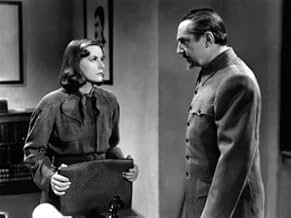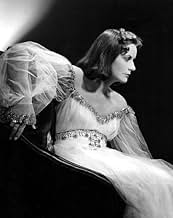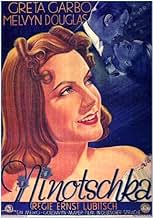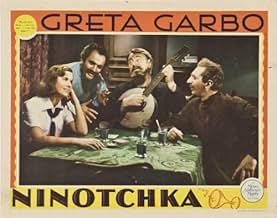PUNTUACIÓN EN IMDb
7,8/10
24 mil
TU PUNTUACIÓN
Una severa mujer rusa, enviada a París en misión oficial, se siente atraída por un hombre que representa todo lo que se supone que ella detesta.Una severa mujer rusa, enviada a París en misión oficial, se siente atraída por un hombre que representa todo lo que se supone que ella detesta.Una severa mujer rusa, enviada a París en misión oficial, se siente atraída por un hombre que representa todo lo que se supone que ella detesta.
- Nominado para 4 premios Óscar
- 3 premios y 6 nominaciones en total
Dorothy Adams
- Swana's Maid
- (sin acreditar)
Monya Andre
- Gossip
- (sin acreditar)
Nino Bellini
- Swana's Restaurant Guest
- (sin acreditar)
Wilda Bennett
- Swana's Restaurant Guest
- (sin acreditar)
Eumenio Blanco
- Waiter
- (sin acreditar)
Symona Boniface
- Gossip
- (sin acreditar)
Frederika Brown
- Swana's Restaurant Patron
- (sin acreditar)
Argumento
¿Sabías que...?
- CuriosidadesGreta Garbo had her misgivings about appearing in a comedy and was particularly nervous about the drunk scene, which she considered to be highly vulgar.
- PifiasWhen Ninotchka tells a funny story, objects on the desk change positions.
- Versiones alternativasAlso available in a computer colorized version.
- ConexionesEdited into Hollywood: The Dream Factory (1972)
Reseña destacada
While it's a given that Greta Garbo was the most enigmatic of film stars during Hollywood's golden age, it's also fair to state that she may be the least relevant today for her austere beauty and cool, sometimes unapproachable demeanor. Yet, all that is erased with this 1939 comedy masterwork which brilliantly teams her with the master of innuendo-filled scintillation, Ernst Lubitsch. With a laser-sharp, witty script by Walter Reisch, Charles Brackett and Billy Wilder (before he became a master director himself), this classic is one part political comedy, one part screwball farce and one part romantic whimsy, all blended impeccably with the famous Lubitsch touch.
The plot involves Nina Ivanovna Yakushova, a Soviet envoy sent to Paris to ensure that the government receives the proceeds from the sale of jewels once owned and still coveted by the Grand Duchess Swana, now an expatriate. The cold, emotionless envoy goes about superseding the three lesser envoys who have been assimilating themselves into the frivolous, capitalistic world of Paris thanks to Count Leon, a tuxedoed dandy and the duchess's constant escort. It is Leon who dubs the envoy Ninotchka, and after initial resistance, the two find themselves falling in love but not at the expense of her convictions about the omnipotence of Communist values. The jewels become a negotiation ploy that complicates their affair as does the Grand Duchess herself. The plot develops in unexpected ways and through such clever observational humor that the ending comes all too soon.
While she is deified by many for the operatic tragedy of "Camille" and the mannered mystique of "Mata Hari", Garbo seems at first to be a parody of her sullen screen image with witty one-liners delivered in hilarious deadpan, but she, like her character, blossoms into a warm, comically romantic presence as the film progresses. It's a wondrous transformation and the one performance that assures Garbo her lasting stature more than any other. As Leon, Melvyn Douglas specialized in William Powell-knockoff roles like this one and while he does get a bit excessive in his 1930's-style romantic gestures, he is sophisticated and genial enough to have us believe Ninotchka may give up Mother Russia for him.
At first, stage legend Ina Claire seems like she will play the Grand Duchess Swana as a dotty ninny, but when her talons show, she is an excellent match for Garbo in their scenes together. As the trio of envoys ensconced in the good life, Sig Ruman, Felix Bressart and Alexander Granach make a merry chorus to the proceedings. I particularly like the scenes back in Russia when they share an omelet dinner with Ninotchka in her Soviet-sanctioned, multiple-occupant room. The print transfer on the 2005 DVD is pristine and brings out William Daniels' sparkling, black-and-white cinematography, though the only extra is the film's original trailer. This is truly a must-see.
The plot involves Nina Ivanovna Yakushova, a Soviet envoy sent to Paris to ensure that the government receives the proceeds from the sale of jewels once owned and still coveted by the Grand Duchess Swana, now an expatriate. The cold, emotionless envoy goes about superseding the three lesser envoys who have been assimilating themselves into the frivolous, capitalistic world of Paris thanks to Count Leon, a tuxedoed dandy and the duchess's constant escort. It is Leon who dubs the envoy Ninotchka, and after initial resistance, the two find themselves falling in love but not at the expense of her convictions about the omnipotence of Communist values. The jewels become a negotiation ploy that complicates their affair as does the Grand Duchess herself. The plot develops in unexpected ways and through such clever observational humor that the ending comes all too soon.
While she is deified by many for the operatic tragedy of "Camille" and the mannered mystique of "Mata Hari", Garbo seems at first to be a parody of her sullen screen image with witty one-liners delivered in hilarious deadpan, but she, like her character, blossoms into a warm, comically romantic presence as the film progresses. It's a wondrous transformation and the one performance that assures Garbo her lasting stature more than any other. As Leon, Melvyn Douglas specialized in William Powell-knockoff roles like this one and while he does get a bit excessive in his 1930's-style romantic gestures, he is sophisticated and genial enough to have us believe Ninotchka may give up Mother Russia for him.
At first, stage legend Ina Claire seems like she will play the Grand Duchess Swana as a dotty ninny, but when her talons show, she is an excellent match for Garbo in their scenes together. As the trio of envoys ensconced in the good life, Sig Ruman, Felix Bressart and Alexander Granach make a merry chorus to the proceedings. I particularly like the scenes back in Russia when they share an omelet dinner with Ninotchka in her Soviet-sanctioned, multiple-occupant room. The print transfer on the 2005 DVD is pristine and brings out William Daniels' sparkling, black-and-white cinematography, though the only extra is the film's original trailer. This is truly a must-see.
- EUyeshima
- 8 may 2006
- Enlace permanente
Selecciones populares
Inicia sesión para calificar y añadir a tu lista para recibir recomendaciones personalizadas
- How long is Ninotchka?Con tecnología de Alexa
Detalles
Taquilla
- Presupuesto
- 1.365.000 US$ (estimación)
- Recaudación en todo el mundo
- 2477 US$
- Duración1 hora 50 minutos
- Color
- Relación de aspecto
- 1.37 : 1
Contribuir a esta página
Sugerir un cambio o añadir el contenido que falta

Principal laguna de datos
By what name was Ninotchka (1939) officially released in India in English?
Responde























